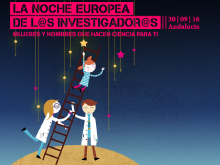Once again, researchers from cicCartuja will participate in the European Researchers’ Night, an initiative promoted by the European Commission within the framework of the Horizon 2020 programme. The event will take place simultaneously in more than two hundred and fifty cities in Europe and neighbouring countries on 30 September.
In Seville, the Spanish National Research Council (CSIC), the University of Seville (US), the Pablo de Olavide University (UPO) and the City Council of Seville, among other institutions, have joined forces to offer a programme made up of workshops, micro-meetings and shows. The aim is to foster a rapprochement between citizens and the scientific community in a relaxed atmosphere and through informative language.
The unique format of this initiative allows citizens to learn more about the work carried out by researchers and to overcome some of the stereotypes that weigh on them. Researchers, for their part, are given the opportunity to demonstrate that they are not oblivious to the reality outside their laboratories.
The micro-meetings in which the researchers will participate will be structured around a talk where various concepts will be introduced and discussed with the public, using examples from recent research.
Further details of each activity are provided below:
Organometallics: cyborg molecules that revolutionize Chemistry
Juan Cámpora Pérez (IIQ)
Location: Carpa 3 / CSIC. Plaza Nueva, Seville
Time: 18.00-18.45 h
Summary of the activity: Chemistry is a fundamental discipline, so much so that without it it would be impossible to explain technological and social progress. This branch of science also has a fun and surprising side, which often goes unnoticed by the media. For this reason, Chemistry can build a barrier between itself and the non-specialized public. This activity will overcome this barrier and will delve into areas such as the science of molecules: from the six atoms that constitute the basis of life (carbon, hydrogen, oxygen, nitrogen, phosphorus and sulfur) to the rest of the Periodic Table.
Can we have custom ceramics by manipulating the nanoworld?
Rosalía Poyato Galán (ICMS)
Location: Tent 4 / CSIC. Plaza Nueva, Seville
Time: 10:00-10:30 p.m.
Summary of the activity: ceramic materials are highly fragile, which is a problem if we take into account their multiple applications, both in everyday items and in more specific ones (oxygen sensors, turbines, prostheses, etc.). Nanotechnology is presented as a solution to this problem and proposes the manipulation of materials at the nanoscale to modify their properties. Will we be able to reduce the fragility of ceramics?
Materials that illuminate our future
Gabriel Lozano Barbero and Dongling Geng (ICMS)
Location: Tent 2 / University of Seville. Plaza Nueva, Seville
Time: 18:00-18:45 h
Summary of the activity: This meeting will review the different methods that man has used to illuminate his daily life throughout history. In addition, there will be a special mention of the materials used today in commercial LED lamps, paying attention to some very peculiar compounds called rare earths. Finally, the role that nanotechnology can play in the development of nanostructured materials that make it possible to manufacture more efficient lamps will be discussed.
More information on the official website of the event



